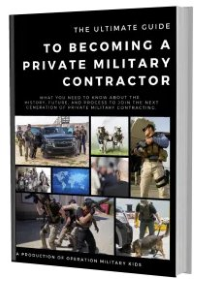 Important Note: If you’re dead serious about becoming a Private Military Contractor, then you NEED to check out our new 106-page eBook here.
Important Note: If you’re dead serious about becoming a Private Military Contractor, then you NEED to check out our new 106-page eBook here.
It details literally everything you need to know about becoming a PMC, and will boost your chances of landing a job dramatically.
All important aspects are discussed, including:
- The risks, benefits, and day-to-day life
- How to find the best and most lucrative PMC companies
- How to craft your resume
- Acing the interview
- What to bring when you deploy
- and much more…
Click Here to learn more.
Also called private military operators, private military contractors are non-military personnel hired or employed by private military companies or PMCs to fill gaps in the US military.
Most of them work as independent contractors, which means they do not enjoy the same kinds of allowances as their army counterparts.
There has been an increase in the number of U.S. military presence overseas which has necessitated further hiring of private security operators by the United States government.
Related Article: 9 Common Private Military Contractor Jobs (and 3 uncommon ones)
More often, people call private military contractors ‘mercenaries’ although they rarely engage in any kind of armed combat; this make the nickname ‘mercenary’ somewhat misleading.
So, what do these professionals do and how can one become a private military contractor?
We’ll answer these questions and many more in this comprehensive guide.
Buckle up for a long read!
Jump To A PMC Section
What Are Private Military Contractors?
The Process Of Becoming A Private Military Contractor
How To Become A Private Military Contractor Without Military Experience
What Are Private Military Contractors Hired to Do?
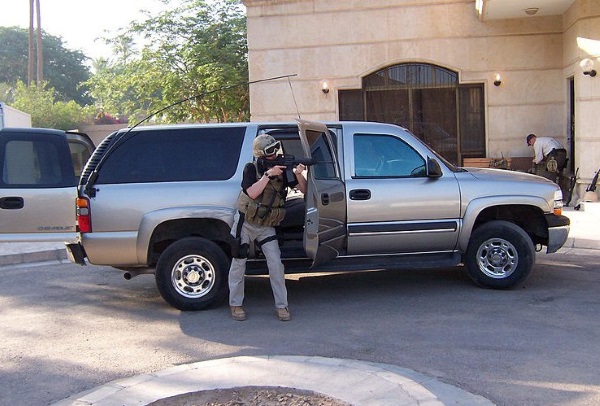
Private military operators are employed essentially to help military officers in war zones and combat situations.
They perform a wide variety of duties including repairing and maintaining infrastructure as well as pipelines.
Other are hired to guard government buildings and corporate headquarters.
In some cases also, they also provide personal protection for dignitaries and politicians.
In terms of roles, these contractors are only involved in defensive duties and thus should not engage in combat unless attacked.
They are not used for offensive military actions, and therefore, as we mentioned earlier, the term “mercenary” may not necessarily suit them.
Most often, private military contractors serve as an armed guard in areas where terrorists or criminals are expected to strike.
For instance, they may ride with a vehicle convoy to show military presence in an area in order to discourage any criminal activities or attempted ambush.
A contractor may also patrol a corporate building at risk of a terrorist attack.
Since they are hired to work in war zones, their job is very different from that of a security person or a bodyguard in civilian life.
As a private military contractor, you have to be prepared, and train for warfare as you will be working in battlefields.
This explains why most professionals in this industry are retired military personnel and veterans.

Some companies hire candidates with extensive knowledge and background in law enforcement to help in intelligence gathering.
In such cases, what is asked for is basic military training and experience, a clean criminal record, and in some cases membership of an association that deals with hiring private military contractors.
Keep in mind that being a private military contractor doesn’t make you a “Rambo” as many people think.
You will have to go through basic training and remain disciplined. You also need to be passionate about adventuring and working in demanding and dangerous places.
Many hiring companies have grown into massive multinationals organizations by hiring retired soldiers and military veterans who serve as private contractors.
Because of working with experienced professionals often, most hiring companies do not provide basic training.
This limits the chances of civilians getting hired, but there are always exceptions whereby some people with non-military experience and training get hired.
In other words, when you sign up for employment as a private military contractor, expect to work in hazardous conditions overseas.
You may be assigned to a military unit protecting assets in warzone area, work for an oil company, combat operations unit of another country, or training unit preparing troops for deployment overseas.
Whatever the assignment, remember that it is demanding and sometimes endangering.
The Process of Becoming a Private Military Contractor
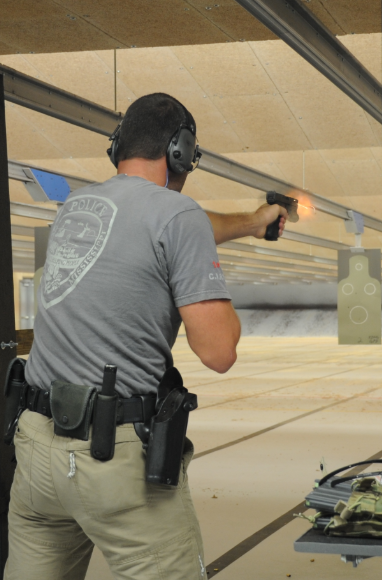
To become a private military contractor, the first thing you’ll do is to undergo vetting after which you’ll be trained to prepare to work with military personnel and in a support position.
You’ll also have to undergo drug screening, security clearance, and comprehensive background checks.
To qualify as a contractor to the military, it’s important for you to maintain great fitness levels as you’ll need to undergo a performance test during interviews.
You need to have a clean record; previous felony charges or any related charges against you will disqualify you from becoming a private military contractor.
Related article: Can You Join The Military With A Felony?
Having prior knowledge in handling weapons will give you an edge, and thus you should endeavor to pursue weapon training courses to increase your chances of getting hired.
Department of Defense is responsible for hiring individuals from private military companies to provide support services to armed combat forces and spends hundreds of billions of dollars to pay salaries and allowances for these individuals.
Here are several things to do to become a private military contractor;
Step 1: Complete your education.
You need a high school diploma or GED to join the military, but getting a college degree will give you an edge over other applicants.
College graduates have an easier route to joining PMCs than people with a high school diploma.
There is no specification as to which course you have to pursue in college, but a degree in criminal justice, police science, public safety, or military science will give you an inside track to becoming a private military operator.
Step 2: Gain security experience.
One of the best ways to do this is by serving in the military, police department, or in government law-enforcement agencies such as the CIA or FBI.
Such experiences will help you when you submit your bid to become a contractor to the military.
Some of the experiences you need to have include basics of gun usage and control, security services, and self-defense tactics.
Step 3: Submit your bids to the DoD for military security work.
This department occasionally contracts private security contractors.
Once you are selected, you will disclose all your background and financial information and also provide security clearances.
Background checks conducted by the Department of Defense can take several months to complete.
How Can You Boost Your Chances of Getting Hired As a Private Military Contractor?
Tip #1: Complete your college degree
If you’re in college pursuing a degree course, it might be wiser to finish it.
If this is not possible, you can switch to another course that will give you an edge over others when it comes to getting hired as a private military contractor.
Courses such as criminal justice, police science, public safety, or military science will give you better leverage to become a private contractor to the military.
Also, learn foreign languages especially Arabic, Spanish, French, and English-languages.
These are the main languages spoken in war zones, and it can give you an advantage in this case.
Once you graduate with your degree, make sure to get TOEFL certifications so you can be eligible to teach.
Tip #2: Get basic gun training skills
If you do not have any military experience, then you need to have basic firearms skills and some experience in handling guns.
Visit gun stores and familiarize yourself with common firearms used by security organizations and military personnel.
Some of the common military firearms include Beretta M9, Glocks 9mms, AR rifles, SIG P220 series, Mossberg shotguns, Remington, AKs, etc.
Tip #3: Check the legalities of becoming a private military contractor overseas
In some countries, the constitution prohibits its citizens from becoming private military contractors overseas.
Therefore, it is important to check the law before proceeding any further to avoid disappointment.
You should also see the legalities surrounding different tiers of operations within the security department to know which are illegal in your home country.
Tip #4: Gain relevant experience
Many private military contractor jobs require applicants to have practical experience in the US military or at a security agency.
Related Article: Top 20 Reasons To Join The Military (and 7 Reasons Not To)
You can enroll to work as a law enforcement officer at a local or state level to have some experience in the security field.
Check the qualification requirement for law enforcement officers in your state to know if it is an avenue you can exploit.
However, most will require you to successfully go through police, public safety, or peace officer academy.
Tip #5: Create an impressive CV
Focus on your job skills, qualifications, and experience that directly matches the jobs you are interested in practicing.
You can have a professional draft an impressive resume for you that showcase your major strengths.
In today’s competitive world, it is important for a private military operator to have all the essential qualifications and skills, as well as the right resume to give you a better chance of getting hired.
Tip #6: Become a paramedic
An easier route to being hired as a private military contractor without experience in combat arms is becoming a paramedic.
You can become a gun-carrying security contractor without prior military or security knowledge because of your medical qualifications.
Although you will not be hired primarily as a shooter, you will be armed. Paramedics work alongside soldiers in battlefields.
To boost your chances of getting hired, you may have to get weapons/security training to supplement your medical certifications.

This way, you will not become a liability in a battlefield.
Being a paramedic/nurse/doctor will make you a valuable asset to the military and most of the times they will do anything necessary to get you a contract, especially when there are in need of medical officers.
Therefore, you may need to spend your earning to go to a nursing school and get a diploma or degree in any medical field.
The experience you will get as a medical professional in battlefields will also help you earn respect when you get back home.
How to Join Private Military Contractor Company without Military Experience
The recruitment method for non-military civilians is not that different as that of people with military experience.
Before you send your application, do your research first on companies that are hiring private military contractors without a military background.
There are several of them, and you only need to know where to find them.
Some of the more well-known private military contracting companies in the US include:
- Academi (formerly known as Blackwater)
- G4S
- MPRI, Inc.
- KBR
- Northbridge Services Group
- Vinnell Corporation
Now that you have identified the companies that can accept your services, the next thing to do is to craft an impressive resume that is up to date and also an application letter.
Now visit the websites of your preferred companies and fill out an application form, and then get an address where you can send your application form.
You will find different job openings listed in different companies; pick the ones that best suit your skills and experience.
Some of the private military contractor jobs requiring no prior military experience include:
- Armor vehicle technician
- Background investigator
- Kennel/driver attendant
- Records manager
- Firefighter
- Proposal writer/manager
- Security alarm monitor
- Water treatment plant operator
- Unarmed security officer
Each position has its own requirements that applicants must meet for them to be considered for interviews.
For example, to be a background investigator, you need to have experience in conducting one-to-one interviews, and at least one year of experience doing this at a government level.
A record manager may only need to have a high school diploma, knowledge of how to use record-keeping software, and several years of experience in records management.
Therefore, keep in mind that you must have all the qualifications needed for any of the positions advertised before you send in any application.
Also, most companies will only accept your application if you are a US citizen. So it is important to check the requirements of each company.
Private Military Companies Pay versus Army Pay
Private military companies do not disclose all the relevant particulars regarding the payroll and names of their clients.
Also, the contractors who worked for these companies rarely speak about the details of their contracts since their contracts require silence.
According to CNN, private military contractors’ salaries range from $500 per day and $720 per day.
For the US army, pay depends on rank and experience.
The higher the rank, the more responsibilities you have and the corresponding pay. A private, doing advanced training pockets $1,468 per month.
A sergeant with over 5 years of experience, earns a base pay of $2,448 per month.
Their salaries vary depending on ranks with the average annual salary of an army officer being $80,157.
Bottom Line
In a nutshell, here are the main takeaways from this guide;
-
- If you want to work in any field that uses or carries firearms, whether an instructor, a security detail, or a guard you will need to have some experience as working as police, security professional, or military officer.
-
- Also, keep in mind that working as a private military contractor is demanding, both mentally and physically. However, it offers you an opportunity to serve your country, especially if you failed to join armed forces.
-
- You will not find these job openings advertised in your local newspaper. Therefore, if you are interested in working with a private military company, the best place to start is online. Visit websites that advertise job openings in the military for retired military and non-military civilians.
-
- Whether or not you have military experience, you follow the same process for joining a military contractor company
-
- Experience in law enforcement, military, or medical field will bolster your chances of being a private military operator
-
- Learning a foreign language and getting certifications for the same will give you a competitive edge over other applicants
-
- Physical fitness is a must
- You have to submit an impressive CV along with your application
That’s it! We hope that this guide helps you land a job as a private military contractor. Best of luck!
- Top 13 Private Military Companies - June 17, 2024
- 9 Common Private Military Contractor Jobs - June 17, 2024
- The Ultimate Guide To Becoming A Private Military Contractor - June 17, 2024


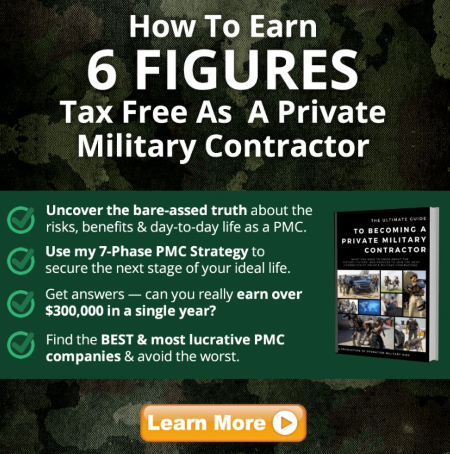
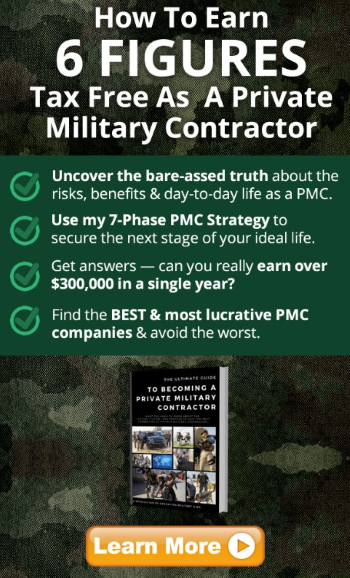

Really a great article, very informative. I’m a police officer looking to move into the private sector. Growth is limited in Policing in today’s society. I appreciate the information and resources!
Thanks for that Dan! We actually are in the process of writing a complete ebook about becoming a Private Military Contractor, and should be releasing it for sale shortly. It will literally have EVERYTHING you need to know about scoring a job as a PMC, from creating your resume to picking the right company, and a TON more.
Stay tuned!
Great article and good advice for those who want to become PMC’s with or without military experience.
Really thorough and up to date coverage of the contemporary PMC scene. Thank you!
Glad to help John!
Bought Ultimate Guide to becoming a PMC and glad I did, I represent a small % from LE Community to get into the PMC community, now with 4 conditional offers I have it all to thanks to the Ultimate Guide!!!!! A Must Read and Purchase!!!!
You’re our very first review, thanks for that Jonathan!
Rob V,
The book is completely 100% accurate and actually takes you step by step thru the process, thanks for writing this, a true God Send for entering a competitive position!
It was actually ghostwritten by a former Marine who became a PMC. He knows ALL the ins and outs, and included literally everything he could (without breaking OPSEC, of course) about the subject.
Glad to help, and keep us posted if you end up getting a job!